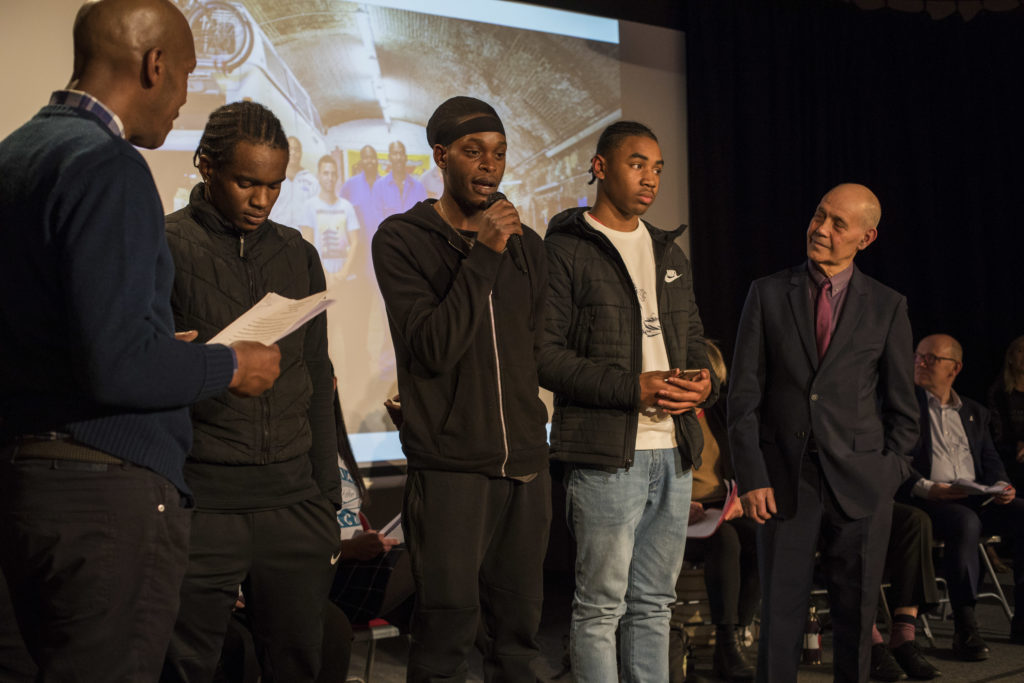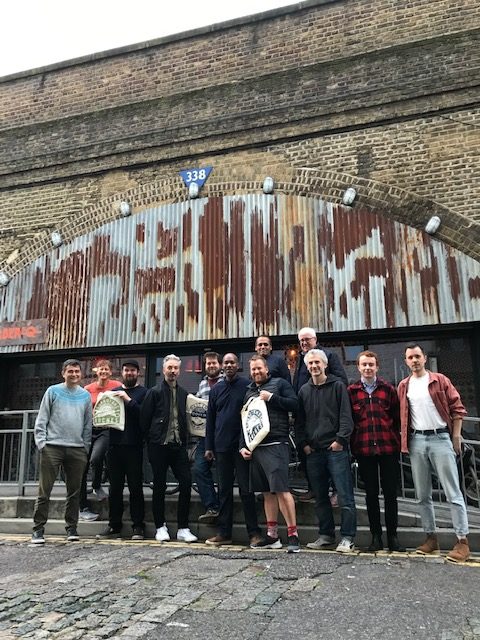Serenading Sadiq, Click Here to Sing With Len!
Blog by Krissie Nicolson, EETG Director.
“The surveyors are missing the most important measurements. They do not capture what is most valuable”. Leonard Maloney, JC Motors.

Since Len took over JC Motors from his mentor Joe Chee in the early 90s he has supported a minimum of 300 young people from disadvantaged backgrounds. He has achieved this either by close relationships with local colleges providing accredited apprenticeships, through work experience with schools or informally for those young people sent to him by neighbours in need of a trusted mentor. Len moved to the UK as a child and has lived in London ever since. He loves his community and puts his heart and soul into everything he does, and he is universally adored and trusted for it.
His legacy to East London should be officially recognised and his continued work ought to be supported by TfL who have the power to keep Len in his arch where he can continue his vital service to London.
Yet what we see instead is a slow deliberate erosion of JC Motors and other businesses like his. We are talking about viable community businesses able to sustain regular rent payments and at the same time inject social and environmental benefits into some of the most deprived areas of the city.
Let’s look at the facts. In 2015 a TfL surveyor showed up at Len’s arch and announced that the rent for JC Motors would increase from 22k to 72k. The trauma that was induced by this act of bureaucratic violence should never have been allowed to happen again, yet, we see TfL continuing further down this line in the hope that Len will lose his will to carry on. As a public landlord, the public expects better and the 2,000 Londoners to have signed Len’s letter to Sadiq Khan so far are strengthening his resolve to continue his fight to stay.
The new lease that Len eventually signed in 2018 would see JC Motors’ rent go to £35,000 for the first two years and then £45,000 ending at £55,000. Len has steadily paid the limit of what he can afford an average of £44,726 every year. The increase caused him great stress and demolished his capacity to take on additional apprentices.
TfL argues that they have been “supportive” and made three options available to Len, none of which are acceptable and akin to a bribe. TfL offered Len a new lease on the condition that he pays the 70k arrears accrued due to the unaffordable rent imposed on JC Motors and settle a new lease at a ‘market rent’. TfL knows that Len cannot afford to pay 70k and they know that he cannot afford market rent which leaves him the remaining two options, one would relocate his business to another smaller property and a final ‘option’ is that TfL waives the 70k arrears that the lease they offered him has incurred, in return for him leaving the arch and giving up his business.
Perhaps leaving Hackney and moving to a smaller arch to a different location in Tower Hamlets with just half the arrears to pay seems fair on the surface. It would be a slow death for JC Motors, a deliberate erosion of community businesses desperately needed by Londoners but not profitable enough for TfL. This leaves the final option – leave Stean Street with no arrears or rent to pay to the end of the lease next month. In this last option, TfL clearly spells out how little they regard JC Motors.
The culture of the property sector is so deeply rooted in an outdated market-first approach that many of the people who work inside it fail to see when they have lost their humanity. All small-scale community businesses are human-centred, driven by people, not the market system.
This isn’t just about Len this is about London and the kind of city we want to live in. If we don’t stop the “computer says no” mentality everything we hold dear about London will be lost. We urgently need affordable commercial spaces particularly light industrial areas where people can repair, create, make, eat, and play and earn a livelihood to provide jobs that can pay for the housing costs enabling them to stay in the place they call home. The stability gained from affordable commercial rents will enable the economic resilience we need for sustainable recovery. The growth-at-all-costs mindset will see deeper instability and prolong the recession and simply isn’t necessary.
Since the Guild was established in 2012 there has not been any affordable workspace policy published from Transport for London. The current draft of a policy from TfL favours a dismantling of the affordable areas already in situ and creating forced ‘affordable zones’ for the specific businesses they favour.
After tirelessly building good relationships within the GLA since 2012 in 2019 the Guild was awarded funding by the LEAP (London Economic Action Partnership) to research what an affordable ‘Working Rent’ policy might look like in arches.
In partnership with the New Economics Foundation, our members and their neighbours co-produced this research. We presented our findings to senior GLA representatives just prior to the pandemic in January 2020. Our policy recommendations include Social Value Leases already in use by progressive Labour boroughs Islington and Haringey.

Since the Guild first conducted a listening campaign back in 2010 the common theme to return from active members ever since has been the gaping lack of affordable places for people to rent to earn a living and serve their community.
It stands to reason then that a London which is affordable will be of central importance to Londoners voting in the upcoming Mayoral election and indeed the general elections too.
What Londoners may be interested to know is that in 2017/18 income from arches was so small in the grand scheme of things that they would only pay to keep the underground running for 2 days per year (based on the 2018/19 cost of the Underground). And in 2021/22, rents receivable made up just 1.8% of TfL group’s total gross income.
Let’s assume that the amount of rent TfL received from arches in 2017/18 (£8.6m) has at most risen by 50% between then and 2021/22. That would mean the current rent collected from the arches is at most £12.9m. This would cover just 2.1 days per year of the cost of running the Underground or 1.6 days per year of the cost of running Buses, streets and other operations.
TfL’s finances have taken a significant hit since the pandemic. Still, unless they can prove otherwise, it appears that rent from commercial property and from the arches is so small as to be practically immaterial to their wider financial performance.
Further to this not making any financial or moral sense Len’s business meets the criteria for below Market rent set out in the GLA’s own rule book – The London Plan (2021, p.246) the GLA defines Affordable Workspace as:
“Workspace that is provided at rents maintained below the market rate for a specific social, cultural, or economic development purpose. It can be provided directly by a public, charitable or other supporting body; through grant and management arrangements (for example through land trusts); and/or secured permanently by planning or other agreements”.
Such “specific… purpose[s]” include workspace that is:
- Dedicated to specific sectors that have social value such as charities or social enterprises.
- Dedicated to specific sectors that have cultural value such as artists’ studios and designer-maker spaces.
- Dedicated to disadvantaged groups starting up in any sector.
- Providing educational outcomes through connections to schools, colleges or higher education.
- Supporting start-up businesses or regeneration.”
The pattern of small businesses from all backgrounds and particularly working-class, black and brown-owned businesses being squeezed out is a global issue of displacement from cities. As a membership organisation rooted in a Community Organising approach we are committed to the global movement for a Solidarity Economy and our long-term aim is to create a Community Land Trust where local people who own the land in trust democratically determine what rent should be paid.
This afternoon we are meeting with Seb Dance, Deputy Mayor of London for TfL. Like JC Motors our wider membership of small businesses and social enterprises also each has its own following of thousands of loyal local customers, suppliers and neighbours who will all be extremely interested in the outcome of today’s meeting.
We hope that this meeting will see TfL do the right thing but if it doesn’t, we will need to escalate the fight for our ‘right to the city’ as Lefebvre put it.
Len has a fine singing voice and regularly attends Karaoke to ease the tension. If the meeting does not go Len’s way we invite you to serenade Sadiq Khan with Len in a secret location this Thursday 13th at 11am.
First Len will sing the Ben E King classic – Stand By Me solo! Then those of you who choose to will literally Stand (or sit) By Len until we have hundreds of people standing (or sitting) by him and singing with him. This plan b only works if we have enough people committed to showing up. Words inspire but only action creates change!
We will email everyone the outcome of today’s meeting to everyone who signs up tomorrow morning. CLICK HERE NOW TO REGISTER!
